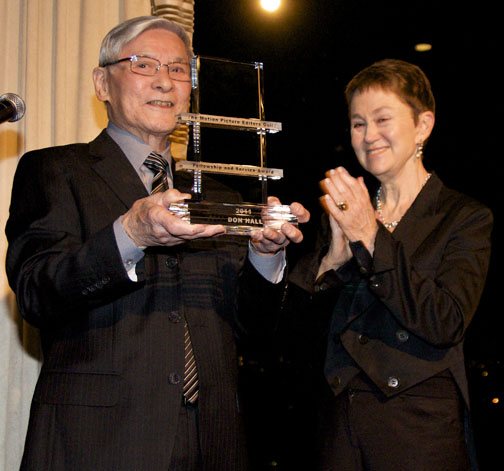Don Hall:
A Hands-On Collaborator
During a busy and productive career that spans 60 years in film and television, sound editor Don Hall––the 2011 recipient of the Editors Guild’s prestigious Fellowship and Service Award, to be presented to him at a ceremony scheduled for October 15––has collaborated with a number of prominent directors. Among them are Otto Preminger, Robert Wise, Arthur Hiller, Mel Brooks, Robert Altman, William Friedkin and John Frankenheimer. Hall’s impressive resume includes over 90 credits in both features and TV, including Patton, The French Connection, Towering Inferno, Young Frankenstein, Single White Female, A Walk in the Clouds, M*A*S*H (the film and the series), Land of the Giants, Lost in Space, The Love Boat, Charlie’s Angels and Barnaby Jones.
“In the early days, I was not as philosophical as I am today; I was maybe more intuitive.”
Following a full and active career as a sound editor and administrator, Hall is currently enjoying a second career as a senior lecturer at USC School of Cinematic Arts, where he teaches sound design, production sound, sound editing and mixing. He also serves as a mentor for graduates pursuing an MFA in Film and TV Production with an emphasis in sound design.
His work has been honored with Emmy Awards for Voyage to the Bottom of the Sea and Tribes, and a Peabody Award for Excellence in Television for the M*A*S*H series. He received a British Academy of Film and Television Arts (BAFTA) Award for his outstanding work on Butch Cassidy and the Sundance Kid. In addition, both the Motion Picture Sound Editors (MPSE), of which he was a founding member, and the Cinema Audio Society (CAS) have honored him with several awards for film and television projects.
The Guild Connection
“Of equal importance,” Hall continues, “is the organization that supports and protects us: the Motion Picture Editors Guild. I feel qualified to make comments from several viewpoints: studio management, owner/operator and working editor. I came into the union in 1952, a year of significant importance for IATSE as the MPIHP [Motion Picture Industry Health Plan] was formed, followed the next year by the MPIPP [Motion Picture Industry Pension Plan]. They are the premier health and retirement plans that we rely on so heavily today.” In 1990, the separate plans merged into the Motion Picture Industry Pension and Health Plans (MPIPHP).
On the labor side of the equation, Hall cites other advancements: “The eight-year rule to become an editor was subsequently eliminated altogether and the scale rate has steadily increased in all classifications, thereby protecting our members from being underpaid by low-ball filmmakers. I would also include the following in our successes: elimination of the six-day workweek, penalties for employers overworking our members, limits to consecutive days on the job, and hands-on classes for members to stay current as technology changes. In other words, our Guild supports and protects its members, a fact that’s easy to forget in our day and age.”
Even in his current role as a teacher, Hall emphasizes to his students the importance of being a member of the Editors Guild to succeed. He also instructs them to document all of their hours accumulated working on non-union projects, to qualify for membership.
Regarding his selection as this year’s Fellowship and Service Award honoree, Hall remarks, with no sense of false modesty, “Every award that comes to me is a surprise––like this one from the Guild. It helps define the importance of sound in filmmaking.”
Hall was presented the award by Elizabeth Daley, University of Southern California Academic Dean of the School of Cinematic Arts. Daley expressed her delight and gratitude for Hall's service as a senior lecturer at USC, where he teaches the next generation of filmmakers a finer appreciation of “the art of listening.”

Don Hall accepts the Fellowship and Service Award from Dean Elizabeth Daley
Read the full article
Words from his admirers